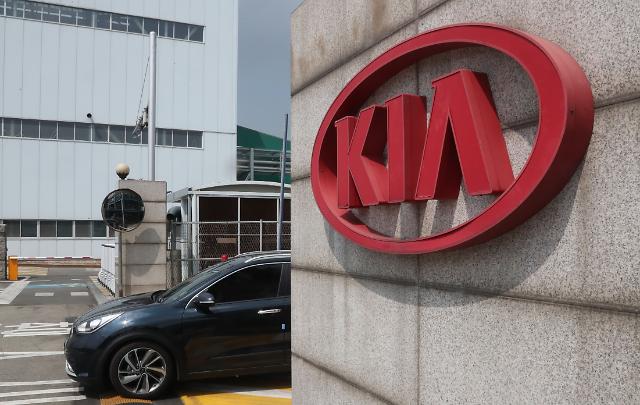
[Yonhap Photo]
A Seoul court on Thursday ordered a major South Korean automaker to retroactively pay some 400 billion won (US$355.8 million) to employees after ruling that regular bonuses should be included in the "ordinary wage" used as the basis for calculating overtime, severance and other payments.
In 2011, 27,424 union members of Kia Motors Corp. filed a suit demanding the company recognize regular bonuses, meal allowances and daily expenses as part of the new concept of salary payment. They have claimed 1.09 trillion won, or about 110 million won per worker, in back payments accrued from the three years prior to the litigation.
The Seoul Central District Court ruled that fixed bonuses and meal costs are part of ordinary salaries and that Kia should pay an overdue amount of 422.4 billion won, or 38.7 percent, of what the union has requested.
That is equivalent to about 15 million won for every employee on the payroll.
In Korea, most businesses pay their employees a lump-sum bonus on a regular basis, aside from ordinary salary. Firms argue that when the bonus is counted as ordinary wage, they have to shoulder a huge financial burden as all other benefits and allowances, such as overtime or retirement pay, are to be recalculated based on the increased ordinary pay.
The automaker has insisted it would cost them as much as 3.1 trillion won. It said the union's move goes against "the principle of good faith," a norm widely used in civil law that one must not ask for something to their own benefit in a deal that will infringe on the rights of the other party.
While the court agreed the retroactive payment will put a strain on the carmaker, it dismissed Kia's claim it would severely undermine its financial health, especially given the lower figure it ordered.
It noted that Kia had recorded robust net profits from 2008 to 2015, with ample retained earnings and a low debt ratio. It also said it received no evidence from Kia to consider possible difficulties from its sputtering China business, amid a trade spat with Beijing over a U.S. missile defense system.
"It's not right to say paying the wage that should've been paid before is a great financial risk to the company," the court said. "The argument about (the workers) violating the principal of good faith is, thus, not acceptable."
The Kia union hailed the court ruling, saying that it "hopes it would serve as a case that better protects labor rights."
"The court ruled that what we've called for was not wrong," Kim Seong-rak, head of the Kia union, told reporters.
The ruling will set an example for a barrage of other similar suits that are ongoing or will likely follow. Kia is a key affiliate of Hyundai Motor Group, the second-largest conglomerate in the country with 218 trillion won in assets.
Kia said it will appeal the ruling. In a statement, it said it "deeply regrets the court decision that it did not acknowledge the principal of good faith and questions the judgment on the company's management conditions."
The automaker pointed out the aggregate amount it would need to cover for the retroactive payment is tentatively estimated at around 1 trillion won, given the several other similar wage suits it's involved in.
It also added that the company suffered a 44 percent on-year decline in operating profit for the first half of this year. It said it will run in the red in the next quarter should it need to set aside more reserves against the wage cost.
The debate on the ordinary salary was sparked by a suit lodged by workers at a midsized auto parts company in 2013. Its case led the Supreme Court later that year to deliver a full-bench ruling on the ordinary wage after a series of open hearings.
The top court ruled periodic bonuses should be added to the ordinary wage as they are defined as a salary that's paid "regularly, uniformly and on a fixed basis."
The decision prodded many other firms to file a wage suit against their employers. Data by the Ministry of Employment and Labor show that some 115 workplaces are currently engaged in similar litigations.
The court ruling also came at a time when Kia Motors and other local companies are struggling with falling sales amid severe competitions.
Since early this year, major South Korean companies have been battered by Beijing's retaliatory steps against Seoul's deployment of a U.S. missile defense system.
In the first seven months, Kia sold 149,672 autos in China, down 54 percent from 326,595 units a year ago. The company looks set to miss its sales target of 690,000 units in China this year.
Citing the ratio of labor costs at their domestic plants reaching an average of 12 percent of their combined sales, the country's five carmakers, including GM Korea Co., Renault Samsung Motors Corp. and SsangYong Motor Co., recently warned they may relocate their production lines overseas in the worst-case scenario.
Also, the business community expressed "deep" concerns over the court ruling, saying it would wreak havoc on the industry as a whole.
"The ruling is feared to have a domino impact on other subcontractors and weaken the competitiveness in the manufacturing sector," the Korea Employers Federation said in a statement.
Yonhap News




